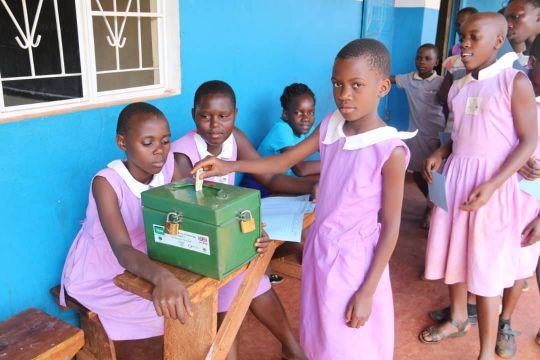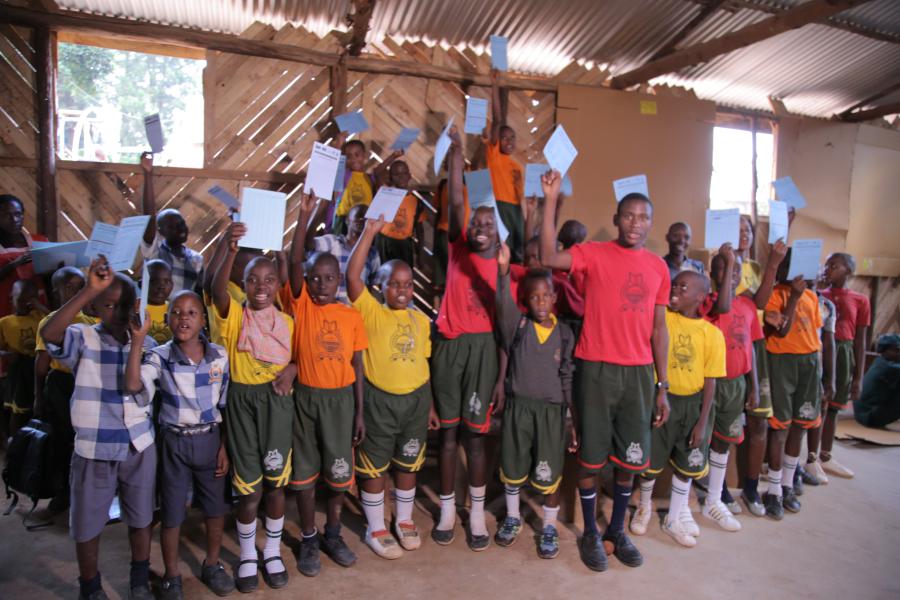Smoothing the Cost of Education: Primary School Saving in Uganda
Even when there are no official school fees, the financial burden of purchasing uniforms, books, and other school supplies prevents low-income students from remaining in school. In Uganda, researchers tested whether a school-based savings program improved academic performance and reduced dropout rates by enabling students and their families to save for school-related expenses.
A version of the program that labeled savings for educational purposes, rather than fully committing money to educational expenses, increased the amount students saved, expenditures on educational supplies, and test scores.
Policy Issue
Although many countries in Sub-Saharan Africa have close to universal primary school enrollment, many students drop out before completing primary school or fail to continue to secondary school. While children drop out for a number of reasons, financial concerns are often an important factor.
Even when governments eliminate school fees, there are still many costs associated with attending school. Providing basic school supplies such as uniforms, pens, pencils, and workbooks is often a significant challenge for low-income families. Furthermore, these families may lack access to formal savings services, making it difficult to set aside money for education. Even when families do have some savings, there is no guarantee they will use the money for educational expenditures. This evaluation assesses the impact of a school-based savings program that aims to encourage students and their parents to save for educational expenses.
Context of the Evaluation
Uganda’s primary school enrollment rates have greatly increased since the government began providing free universal primary education. Retaining pupils, however, is more difficult and as few as 32 percent of children entering primary school complete all seven grades. While the government covers the cost of teachers and schools, many Ugandan primary schools require uniforms, and families are responsible for providing school supplies such as stationary and workbooks. The financial strain of buying these supplies is often too high for the family to sustain, and is cited as a major reason for children dropping out of school.
Details of the Intervention
Researchers partnered with the Private Education Development Network (PEDN) and FINCA Uganda to implement and test the “Super Savers” program in public primary schools. Children in grades five through seven, the final three years of primary school, were given the opportunity to deposit money into lockboxes on a daily or weekly basis. The money was deposited into the school’s bank account at the end of each trimester. The bank accounts did not earn interest. At the beginning of the next trimester, bank representatives returned to the school to disburse the funds. On the day the funds were paid out, PEDN organized a small market at each school where students could purchase school supplies or school services such as practice exams or tutoring sessions.
Schools were randomly assigned to have students’ savings returned in one of two ways:
- Voucher payout: students received their savings in the form of a voucher that could only be used to buy supplies or school services at the market set up at the school. This created a binding commitment to spend savings on educational expenditures.
- Cash payout: students received their savings in cash, which meant they could spend the funds either at the market set up at the school or however else they chose.
Students were notified of the kind of payout they would receive at the beginning of the program. There were 39 schools in each group, and an additional 58 schools served as a comparison group received no savings account.
Half of the schools in each payout group were also randomly assigned to receive parent outreach, in which workers from PEDN hosted a workshop for sixth- and seventh-grade parents to describe the various ways they could support their children’s education and to promote the savings program as a tool to help families finance school expenditures.
Results and Policy Lessons
Researchers found that students deposited significantly more when their savings were returned in cash, rather than vouchers. On average, students in schools that received cash payouts deposited between 2,200 and 2,340 Ugandan shillings, while the average student who received voucher payouts deposited between 1,120 and 1,180 shillings.
The purpose of the voucher payouts was to commit students to spend their savings on educational expenses. Cash payouts, on the other hand, imposed no restrictions on the use of savings, but did provide a weak commitment to spend savings on educational expenses by basing the savings program in schools and timing payouts to correspond with markets for school supplies.
This weaker commitment may have appealed to students who value flexibility on how to spend their savings, while the voucher treatment’s stronger commitment may have discouraged them from saving. When combined with parent outreach, students who received cash payouts were significantly more likely to have a complete set of school supplies. They also had test scores that were 0.11 standard deviations higher than the comparison group.
There were no significant positive effects on school supplies or test scores among students who received cash payouts without parent outreach or among students who received vouchers, with or without parent outreach. These results suggest that combining cash payouts from savings accounts with parental outreach can lead households to spend savings on education and improve student learning.
To read more https://www.poverty-action.org/study/smoothing-cost-education-primary-school-saving-uganda#










